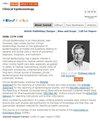晚期肝胆癌患者使用抗癌药物与不使用抗癌药物的比较:制图回顾和证据缺口图
IF 3.4
2区 医学
Q1 PUBLIC, ENVIRONMENTAL & OCCUPATIONAL HEALTH
引用次数: 0
摘要
导言:尽管抗癌药物(ACDs)被普遍推荐,但对晚期胆囊癌(HBCs)患者生存以外重要结局的影响可能尚未得到充分评估。考虑到以患者为中心的结果,我们的目标是识别和绘制晚期乙肝患者ACDs与最佳支持治疗(BSC)的证据。方法:在这篇图谱综述中,我们纳入了系统综述、随机对照试验、准实验和观察性研究,比较ACDs(化疗、免疫治疗、生物/靶向治疗)与BSC治疗晚期乙型肝炎的疗效。我们检索了MEDLINE (PubMed)、EMBASE (Ovid)、Cochrane Library、Epistemonikos、PROSPERO和clinicaltrials.gov以寻找符合条件的研究。两名审稿人进行了筛选和数据提取过程。我们为每种癌症绘制了证据图。结果:我们纳入了87项研究(60项针对晚期肝癌,27项针对胆囊或胆管癌)。大多数证据支持ACDs的生存结果,BSC的毒性。我们发现了一些非生存结局的证据缺口,包括生活质量或临终关怀的质量。讨论:现有证据不足以评估晚期乙型肝炎患者生存之外的重要结局。未来的研究需要解决这些差距,以便更好地为决策过程提供信息。关键词:肝脏肿瘤,胆囊肿瘤,胆管肿瘤,抗肿瘤药物,免疫治疗,生物治疗,姑息治疗本文章由计算机程序翻译,如有差异,请以英文原文为准。
Anticancer Drugs Compared to No Anticancer Drugs in Patients with Advanced Hepatobiliary Cancer: A Mapping Review and Evidence Gap Map
Introduction: Despite being commonly recommended, the impact of anticancer drugs (ACDs) on patient-important outcomes beyond survival for advanced hepatobiliary cancers (HBCs) may not have been sufficiently assessed. We aim to identify and map the evidence regarding ACDs versus best supportive care (BSC) for advanced HBCs, considering patient-centered outcomes. Methods: In this mapping review, we included systematic reviews, randomized controlled trials, quasi-experimental, and observational studies comparing ACDs (chemotherapy, immunotherapy, biological/targeted therapy) versus BSC for advanced HBCs. We searched MEDLINE (PubMed), EMBASE (Ovid), Cochrane Library, Epistemonikos, PROSPERO and clinicaltrials.gov for eligible studies. Two reviewers performed the screening and data extraction processes. We developed evidence maps for each type of cancer. Results: We included 87 studies (60 for advanced liver cancer and 27 for gallbladder or bile duct cancers). Most of the evidence favored ACDs for survival outcomes, and BSC for toxicity. We identified several evidence gaps for non-survival outcomes, including quality of life or quality of end-of-life care. Discussion: Patient-important outcomes beyond survival in advanced HBCs are insufficiently assessed by the available evidence. Future studies need to address these gaps to better inform decision-making processes. Keywords: liver neoplasms, gallbladder neoplasms, bile duct neoplasms, antineoplastic agents, immunotherapy, biological therapy, palliative care
求助全文
通过发布文献求助,成功后即可免费获取论文全文。
去求助
来源期刊

Clinical Epidemiology
Medicine-Epidemiology
CiteScore
6.30
自引率
5.10%
发文量
169
审稿时长
16 weeks
期刊介绍:
Clinical Epidemiology is an international, peer reviewed, open access journal. Clinical Epidemiology focuses on the application of epidemiological principles and questions relating to patients and clinical care in terms of prevention, diagnosis, prognosis, and treatment.
Clinical Epidemiology welcomes papers covering these topics in form of original research and systematic reviews.
Clinical Epidemiology has a special interest in international electronic medical patient records and other routine health care data, especially as applied to safety of medical interventions, clinical utility of diagnostic procedures, understanding short- and long-term clinical course of diseases, clinical epidemiological and biostatistical methods, and systematic reviews.
When considering submission of a paper utilizing publicly-available data, authors should ensure that such studies add significantly to the body of knowledge and that they use appropriate validated methods for identifying health outcomes.
The journal has launched special series describing existing data sources for clinical epidemiology, international health care systems and validation studies of algorithms based on databases and registries.
 求助内容:
求助内容: 应助结果提醒方式:
应助结果提醒方式:


